Giant Peacock Bass Race for Your Topwater Plug Here!By Larry Larsen
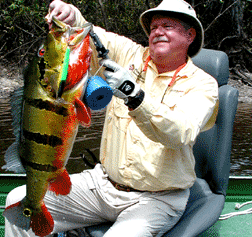 My cast was like the previous 200 -- medium distance to a spot some
20 to 30 feet off the closest sandbar bank. And like many before that morning in Lago Piraracu, I expected the big strike. A 15-pounder, and soon after a 16-pounder, had jumped on the same Parrot-colored Big
Game Woodchopper earlier. My partner for the day had enticed a 13- and 15-pounder also in the prime 9 am to 10 am "big fish" time slot. The big fish were wide awake and active. And I knew that.
My cast was like the previous 200 -- medium distance to a spot some
20 to 30 feet off the closest sandbar bank. And like many before that morning in Lago Piraracu, I expected the big strike. A 15-pounder, and soon after a 16-pounder, had jumped on the same Parrot-colored Big
Game Woodchopper earlier. My partner for the day had enticed a 13- and 15-pounder also in the prime 9 am to 10 am "big fish" time slot. The big fish were wide awake and active. And I knew that.
The topwater splashed down and I started my rhythmic-cadence retrieve. I only was able to impart one jerk when the green-hued bait disappeared in a huge explosion. I set the hook and held on while the
"obviously giant" fish tore off away from the boat. Then, it stopped. I heaved back on my medium-heavy action rod to turn the fish, but it wouldn't move.
This battle and our guide, Isaque, yelling "grande, grande, grande" from his position at the stern of the aluminum boat now had the attention of my fishing buddy and agent Don Cutter.
"What do you have?, my partner questioned me.
"I not sure," I answered, as the fish again took off in another direction. "I keep trying to turn him and can't, but
then, he stops momentarily. It's a really big fish, but it's fighting funny."
"I think it might be a catfish," I continued, as the fish again seemed to pause and then change course. "It's
not jumping either. I stopped its run, but I just can't turn it or pull it toward me."
Finally some 40 feet out, the fish boiled at the surface, or more appropriately described, wallowed, and we
noticed the broad side of a huge 3-bar peacock. I felt better about what I was battling, but was still puzzled by the fight.
Twenty feet off the gunwale, I was able to again bring the fish to the surface, and in the black-clear lagoon waters, the whole situation became clear. My bewilderment vanished when I noticed a second big peacock
hanging onto the Woodchopper.
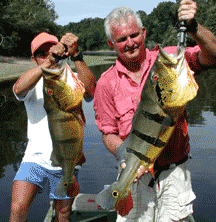 The "teammates" on opposite ends of the plug had obviously slammed it
at the same time. I was fortunate enough to bring them to the boat without one getting off. When the twosome was aligned together and powering away from me in the same direction, I just couldn't stop them. Then, one of
the peacocks would turn and stop their forward drive and momentum, but even though I put all the pressure I could muster through my strong rods, I had trouble moving them in my direction.
The "teammates" on opposite ends of the plug had obviously slammed it
at the same time. I was fortunate enough to bring them to the boat without one getting off. When the twosome was aligned together and powering away from me in the same direction, I just couldn't stop them. Then, one of
the peacocks would turn and stop their forward drive and momentum, but even though I put all the pressure I could muster through my strong rods, I had trouble moving them in my direction.
Isaque netted the two giant peacocks, as Don videotaped the action with his Sony. We then put two BogaGrips to use and I held up each peacock
still attached to the plug. The largest "teammate" weighed 17 pounds while the smaller still pulled the scales down to 13 pounds. The 30 pound "double-on-one-plug" was my largest to date. In fact, I can't remember ever
landing a "teener" peacock in my 12 or 15 "doubles-on-one-plug" that I have caught over the years.
That experience was memorable, but so was the rest of the day, much of which was spent in that same
lagoon off the Preto River about 30 minutes above its intersection with the Rio Unini. I landed another 17 ½ pounder a little later and Don captured a 16 pound giant, all on topwater fare. There was still plenty of
surface activity going on while we were present, and the day's results were impressive: I had 15 peacock including 8 fish over 13 pounds and 3 others in the 10 to 13-pound category. Don amassed 13 peacocks
that day which included four "teeners" and the largest fish of the day, an 18-pounder.
The half-mile long Lago Piraracu is interesting from another aspect. It has a resident population of
monkeys. We watched between 25 and 30 of them swinging through the trees as we fished through the middle section of the lagoon. Three huge trees along
the eastern bank seemed to provide the best "hang-out" place for the large tribe of "macaco", as they are called in Brazil. Parrots, such as macaw, toucan and papagaios (green parrots), flew overhead in the
lagoon as well as along the rivers and other lakes throughout that area. We noticed a few caiman along the banks, patos (ducks) in the skies, and freshwater dolphin in the deeper river sections adjacent the mouths
of lagoons, and both tapir and capybara were also spotted along the Unini by others in our group.The water level in the river and lagoons was excellent, but daily rains starting three days before our arrival
and ending two days into our fishing did cause the river to rise about 6 inches. Some waters did get a little turbid, but the prime black-clear waters with a visibility of 18 inches or so remained in many areas.
Chopper Classes
We tossed 7-inch long topwater Woodchoppers at points, sandbars, pockets, large laydowns, creeks and
down the middle. We also threw them at any fish that we sighted. Sometimes, they would be chasing bait near one shoreline or in the middle of the lagoon, and at others, the big fish would be near a ball of fry on the
surface. As per usual, I would loft my cast toward any disturbed water, and often, that would result in a strike.
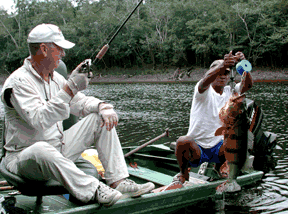 The Big Game Woodchoppers worked well for me all week and the
parrot color seemed to be the top producer. I caught 25 teeners (peacock 13 pounds or larger), and the big topwater plug fooled all but an 18-pound spoon-caught fish. Twelve of those fish were over
15 pounds, which makes for a very exciting week. In all, our 4-man group caught 95 peacocks over 10 pounds including 40 "teeners". The largest was taken on Day 4 when my partner Greg Thompson
tossed his chopper to the edge of a small, murky-water lagoon off the upper Unini. The 20 pounder struck his bait as I set the hook into a 9-pounder a couple yards away.
The Big Game Woodchoppers worked well for me all week and the
parrot color seemed to be the top producer. I caught 25 teeners (peacock 13 pounds or larger), and the big topwater plug fooled all but an 18-pound spoon-caught fish. Twelve of those fish were over
15 pounds, which makes for a very exciting week. In all, our 4-man group caught 95 peacocks over 10 pounds including 40 "teeners". The largest was taken on Day 4 when my partner Greg Thompson
tossed his chopper to the edge of a small, murky-water lagoon off the upper Unini. The 20 pounder struck his bait as I set the hook into a 9-pounder a couple yards away.
Most of our fish were taken from deep, blackwater lagoons, and the Preto seemed to offer better water quality, as the river was rising after the showers. One of the better
lagoons, however, was on the Unini above the houseboat about 30 minutes by fishing boat. Greg and I helped our guide pull and push our aluminum boat sans outboard into a small lagoon alive with active fish.
Can't Keep Out Lunker Hunters
We stopped at the "almost-landlocked" lagoon on a large sandbar that blocked the entrance, and we
walked to lake's edge some 20 yards off the Unini. Seeing peacocks chasing forage in front of us, we each made a long cast to the melee. We each had an explosion, and my fish stayed hooked up, as I battled it
from the sandy spit. Fortunately, I was able to turn the 16 ½ pounder and work it into shallow water fairly
quickly. There, it tore up the shallows, running drag for several yards, to again be pulled back into waters just a couple feet deep.
I landed the fish, weighed it and released it back into the small lake, as other fish continued to frolic throughout. We quickly decided that extra effort to get our boat through a small 3-inch deep channel would
be well worth the trouble. We quickly removed the motor, gas tanks, battery, seats, tackle bag, and cooler, and it was still very heavy. After about 10 a.m., though, we had the boat in the lagoon and battery and cooler
back aboard. We were ready to continue our "exploitation" of those waters.
Within the following hour fishing from the boat, Greg caught two 15-pounders and a 16 pound peacock and I
caught a 14-, 15- and 16-pounder! By 10:30 am we were ready to move on. I finished that day with 13 peacock of which 8 fish were over 10 pounds. Greg, however, had an even better average weight. His 6 fish
weighed 85 pounds, which calculates to an average fish of over 14 pounds each!
Who's Counting Or Even Catching Pequenos
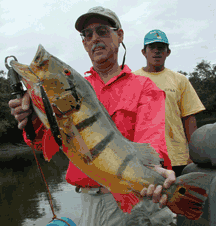 In terms of numbers (and I only fish for "numbers" above 13 pounds),
my third day of that February trip was the best with 22 peacock, but a sole 13 pounder was my only teener. On his third peacock bass trip, W Frazer Letzig, my partner for the day was able to land two
18-pounders which eclipsed his previous personal big fish record by 4 pounds. His fish came on the "clown" pattern and peacock bass pattern Woodchoppers. His first 18 pounder was part of a
double, and again I got the short end of the deal. I had cast out to a likely looking point when a 7-pounder hit my topwater.
In terms of numbers (and I only fish for "numbers" above 13 pounds),
my third day of that February trip was the best with 22 peacock, but a sole 13 pounder was my only teener. On his third peacock bass trip, W Frazer Letzig, my partner for the day was able to land two
18-pounders which eclipsed his previous personal big fish record by 4 pounds. His fish came on the "clown" pattern and peacock bass pattern Woodchoppers. His first 18 pounder was part of a
double, and again I got the short end of the deal. I had cast out to a likely looking point when a 7-pounder hit my topwater.
"Throw in behind my fish quickly," I advised. He did. The second fish
exploded on his topwater, and the rest is, shall we say, history. I was happy for him catching such a pretty fish and one that would establish a new record for him.
Our 4-man group caught 237 fish over the six days on the Unini, but Greg's big fish was far from his biggest. He had taken a 26 pounder in the same waters on a trip to Don
Cutter's operation in November. Don and I had an excellent final day when we ran 2-hours up the Rio Preto and caught 28 peacocks from two small lagoons. He caught and released two 14-pounders and a
17-pounder, while I landed a 13-, three 14- and the 18-pounder. The later was fooled by a #18 Tony Acceta Pet Spoon.
I watched one of the 14's follow my Woodchopper to the boat staying about 2-feet below the surface at all times. When it came time to lift the plug from the surface, I immediately started to swish it one direction and
back the other. It changed directions only once before the big fish exploded on it. I had 3-feet of line off my
rod tip and quite a "close-in" battle. It pulled drag but never got more than 15 feet away from the boat. I used my rod tip to dampen the powerful surges that the fish made and soon had it to the guide who employed the
BogaGrip to capture the fish.
Productive Preto and Unini
The backs of the deeper lagoons were productive areas throughout the week, and I did get to fish with
operation owner Frederico Bais one day. We fished an hour upriver off the Preto on a lake named after a large bird. I caught several teeners including a 17 ½ pounder that Frazer in a follow boat filmed with his
video camera. I "called out" the fish before casting to a prime-looking spot off a irregular point at the back of
the lake. Frederico caught several big fish from that and a connected lake that yielded 3 more teeners for me.
Rio Unini and Rio Preto sandbars with adjacent deep water at the entrance to lagoons and those back in
lagoons held big fish during the week, and as usual, most of my big peacock that weren't chasing forage, were taken 30 or 40 feet off the shoreline. The Rio Unini, a tributary of the Rio Negro located some 210
miles northeast of Manaus, is roughly 200 miles long.
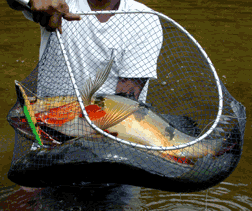 There are about 250 connecting lakes and lagoons
throughout its course, and a waterfall and three sets of rapids lie on the lower portion, which prohibits large riverboat access to the majority of the river during all but
high-water, non-fishing times. As a result, guests of the Unini River Fishing Adventure fly via charter plane to a landing strip beside the operation base, a large aluminum
houseboat that is moored against the riverbank. The houseboat is located about 165 miles from where the blackwater Unini empties into the Rio Negro. There is little
evidence of any villages or river residents around the areas being fished.
There are about 250 connecting lakes and lagoons
throughout its course, and a waterfall and three sets of rapids lie on the lower portion, which prohibits large riverboat access to the majority of the river during all but
high-water, non-fishing times. As a result, guests of the Unini River Fishing Adventure fly via charter plane to a landing strip beside the operation base, a large aluminum
houseboat that is moored against the riverbank. The houseboat is located about 165 miles from where the blackwater Unini empties into the Rio Negro. There is little
evidence of any villages or river residents around the areas being fished.
Operation Organization
The Unini River Fishing Adventure, landing strip and houseboat are owned by Brazilian C. Frederico Bais
and with exclusive agent Don Cutter's input, it has become a very efficient peacock bass operation. The modern houseboat doesn't move at all. In fact, it doesn't even have a motor. The comfortable
accommodations include five spacious, two-bunk staterooms, each with air conditioning and its own private bathroom. There is a large dining room and lounging area, all on the same level.
Agent Don Cutter is very much a detail person when planning your trip. His Pre-Trip package includes my book, "Peacock Bass Addiction", to provide "the inside scoop on what you need to know about peacock
bass fishing", several brochures on the camp, planning suggestions, a Portuguese/English translation sheet and other necessary information. He includes several luggage tags with your name and cabin number on
each so that their staff will not have problems in things in the proper place throughout the trip. Tackle bags are tagged so that they can be placed in the proper boats each morning and taken to the right room after
the fishing day if you so desire.

